Related Research Articles
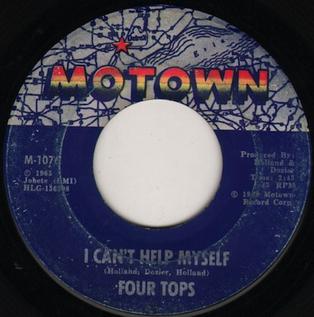
"I Can't Help Myself " is a 1965 hit song recorded by the Four Tops for the Motown label.

"Honeycomb" is a popular song written by Bob Merrill in 1954. The best-selling version was recorded by Jimmie Rodgers and charted at number one on the Billboard Top 100 in 1957. "Honeycomb" also reached number one on the R&B Best Sellers chart and number seven on the Country & Western Best Sellers in Stores chart. It became a gold record. The song is referenced in the McGuire Sisters hit song "Sugartime", in which the soloist sings the line "Just be my honeycomb" and the word "honeycomb" is echoed by the other sisters and the male chorus.
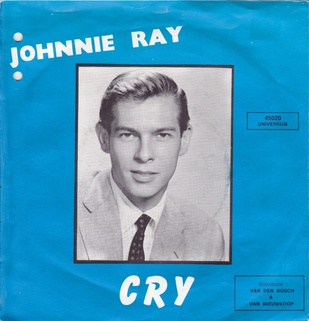
"Cry" is a 1951 popular song written by Churchill Kohlman. The song was first recorded by Ruth Casey on the Cadillac label. The biggest hit version was recorded in New York City by Johnnie Ray and The Four Lads on October 16, 1951. Singer Ronnie Dove also had a big hit with the song in 1966.
"The Little White Cloud that Cried" is a popular song written by Johnnie Ray and published in 1951.

"Go Away Little Girl" is a popular song written by Gerry Goffin and Carole King. It was first recorded by Bobby Vee for Liberty Records on March 28, 1962. The lyrics consist of a young man asking a young attractive woman to stay away from him, so that he will not be tempted to betray his steady girlfriend by kissing her. The song is notable for making the American Top 20 three times: for Steve Lawrence in 1963, for The Happenings in 1966, and for Donny Osmond in 1971. It is also the first song, and one of only nine, to reach US number 1 by two different artists.
"Doggin' Around" is a 1960 Rhythm and blues song written by Lena Agree and originally performed by Jackie Wilson. Reaching both the R&B and the pop singles charts in the U.S., "Doggin' Around" hit number one on the Hot R&B Sides chart for three weeks and peaked at number fifteen on the Billboard Hot 100. The A-side of the single was "Night", based on the aria "My Heart at Thy Sweet Voice" from the opera Samson and Delilah, by Saint-Saëns; it made the top five on the R&B and pop charts.
"A Lover's Question" is a 1958 Pop, R&B hit for Clyde McPhatter. The single was written by Brook Benton and Jimmy T. Williams and was Clyde McPhatter's most successful Pop and R&B release. The bass singer is Noah Hopkins. "A Lover's Question" made it to #6 on the Billboard Hot 100 and was #1 for one week on the R&B chart.
"Apollo Jump" is a 1943 instrumental, written by Lucky Millinder, P. Robinson and Ernest Purce and recorded by Lucky Millinder and His Orchestra. The single was Lucky Millinder's second number one on the Harlem Hit Parade and stayed at number one for two weeks.
"I Wonder" is a 1944 song written and originally performed by Pvt. Cecil Gant. The original version was released on the Bronze label, before Gant re-recorded it for the Gilt-Edge label in Los Angeles. The record made it to number one on the Juke Box Race Records chart and was Pvt. Gant's most successful release. In February 1945, pianist, Roosevelt Sykes hit number one with his version of the song. Roosevelt Sykes version is notable in that it replaced Pvt. Gant's version, at number one on the Juke Box Race Records chart.
"Who Threw the Whiskey in the Well" is a 1945 song performed by Lucky Millinder and His Orchestra. With Wynonie Harris on vocals, "Who Threw the Whiskey in the Well" became Lucky Millinder's most successful release on both the pop and R&B charts. The song went to number one on the R&B Jukebox chart and number seven on the pop chart. Louis Prima recorded a version soon after.
"Funny How Time Slips Away" is a song written by Willie Nelson and first recorded by country singer Billy Walker. Walker's version was issued as single by Columbia Records in June 1961 and peaked at number 23 on the Hot C&W Sides chart.
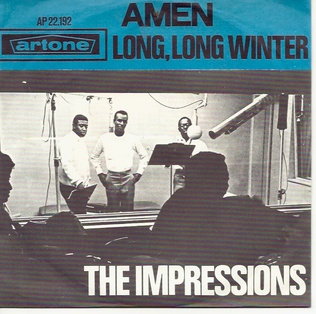
"Amen" is a traditional gospel song that was popularized by The Impressions with their 1964 version.

"The Hucklebuck" is a jazz and R&B dance tune first popularized by Paul Williams and His Hucklebuckers in 1949. The composition of the tune was credited to Andy Gibson, and lyrics were later added by Roy Alfred. The song became a crossover hit and a dance craze, in many ways foreshadowing the popular success of rock and roll a few years later. It was successfully recorded by many other musicians including Lucky Millinder, Roy Milton, Tommy Dorsey, Frank Sinatra, Lionel Hampton, Louis Armstrong, Chubby Checker, Bo Diddley, Otis Redding, Quincy Jones, Canned Heat, Coast to Coast, Brendan Bowyer and Crystal Swing.

You've Got a Friend is an album by American pop singer Johnny Mathis that was released on August 11, 1971, by Columbia Records. The phrase "Today's Great Hits" can be found above the title on both sides of the record jacket as well as both sides of the LP label as if to emphasize that this is essentially an album covering songs that were recently on the charts. This was a common practice of many vocalists of the period, so much so in fact that fellow Columbia artist Andy Williams also released an album titled You've Got a Friend in August 1971 on which he coincidentally covers seven of the 11 tracks that Mathis recorded for this album.
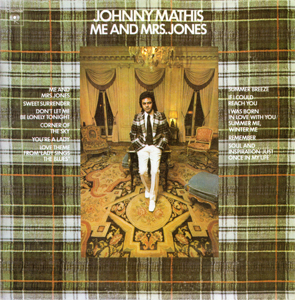
Me and Mrs. Jones is an album by American pop singer Johnny Mathis that was released in January 1973 by Columbia Records. While it does cover several big chart hits of the day like his last album, Song Sung Blue, did, it also includes songs that didn't make the US Top 40 or had never charted.

Unforgettable – A Musical Tribute to Nat King Cole is a soundtrack album released in the UK in 1983 by the CBS Records division of Columbia in conjunction with the broadcast of American pop singer Johnny Mathis's BBC television concert special of the same name that featured Cole's daughter Natalie. The front of the original album jacket credits the concert performers as "Johnny Mathis and Natalie Cole", whereas the CD booklet reads, "Johnny Mathis with special guest Natalie Cole".
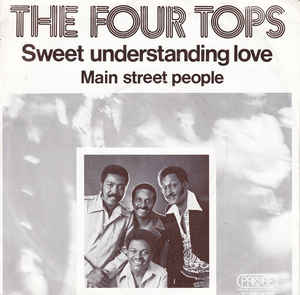
"Sweet Understanding Love" is a 1973 hit song recorded by the Four Tops for the ABC Records label. The song was the second of three single releases from their sixteenth studio album, Main Street People. The title track of the LP is on the B-side of the 45. "Sweet Understanding Love" was placed on their 1991 compilation album Ain't No Woman . It was also included on their album Anthology: 50th Anniversary (2004).

"Little Girl, Don't Cry" is a song written by Lucky Millinder and Doris Davis.
References
- ↑ Scott Yanow. "Lucky Millinder songs" . Retrieved March 10, 2017.
- ↑ Whitburn, Joel (2004). Top R&B/Hip-Hop Singles: 1942-2004. Record Research. p. 401.
- ↑ Whitburn, Joel (2004). The Billboard Book Of Top 40 Country Hits: 1944-2006, Second edition. Record Research. p. 232.